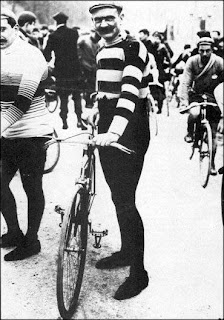 |
| Can you be any more French? Hippolyte Aucouturier, 1903 |
The 1928 edition was won by André Leducq, who would finish that year's Tour de France in 2nd place, then win in 1930 and 1932. 1951 was won by Antonio Bevilacqua who was World Pursuit Champion at the time. 1956 was won by Louison Bobet, going some way towards killing off the "Crybaby" nickname he'd been given by other riders of his day because crybabies do not survive - never mind win - Paris-Roubaix.
1979 brought the second of Francesco Moser's record-equaling three consecutive wins and saw the first use of five cobbled sections: the 1.4km Tilloy-lez-Marchiennes to Sars-et-Rosières, the 1.7km Orchies Chemin des Prières and Chemin des Abattoirs, the 1.2km Auchy-lez-Orchies to Bersee, the 1.8km Camphin-en-Pévèle with it's muddy right corner which has become infamous as one of the most challenging points on the parcours and the 2.1km Camphin-en-Pévèle to Carrefour de l'Arbre, now rated the second most dangerous section after the Trouée d'Arenberg and the section where the race has often been won or lost.
 |
| Tom Boonen (image credit: Tete de la Course CC BY-SA 2.0) |
In 2012, the Belgian rider Tom Boonen scored a superb victory after riding the last 50km solo and gradually building up a lead from that point onwards. By doing so, he equalled Roger de Vlaeminck's record of four victories and, having already won the E3 Harelbeke, Gent–Wevelgem and the Ronde van Vlaanderen in the same year (all of them falling within a 17-day period and the only rider to have ever done so), confirmed his status as the best Classics rider of his generation and one of the best of all time.
 |
| Alessandro Ballan (image credit: Sławek CC BY-SA 2.0) |
The 2007 victory went to the Italian Alessandro Ballan - a breakaway group formed within the first 30km and led for much of the race before being caught by the peloton as they approached the Muur van Geraardsbergen with its maximum gradient of 19.8%. Ballan chose the Muur as the location for his final, decisive attack; knowing that favourite Tom Boonen was suffering after an earlier crash and would be unable to respond. Only Leif Hoste could remain with him to the end, but Ballan - who looks like a climber but excels as a sprinter - was marginally faster to the line.
 |
| Nicole Cooke - the second British rider to win a Monument (image credit: Gsl CC BY-SA 2.5) |
Walter Planckaert - the winner of the 1976 Tour of Flanders, the Dwaars door Vlaanderen in 1977 and 1984 and 71 other races during his professional career - was born in Nevele, Belgium on this day in 1948. His older brother Willy won the Points competition at the 1966 Tour de France and a Dwaars door Vlaanderen of his own a decade later, younger brother Eddy won numerous Grand Tour stages, the Tour of Flanders in 1988 and Paris-Roubaix on this day in 1990.
 |
| Julián Berrendero |
The 2003 Norwegian Road Race Champion Gabriel Rasch, who was born in Hole on this day in 1976, has spent his entire professional career riding with his countryman Thor Hushovd, whom he credits with helping him take the step up to the Pro Teams. However, he was unable to move with Hushovd to BMC for the 2012 season and went instead to FDJ-BigMat. A year later he moved on to Sky.
 |
| Aleksejs Saramotins (image credit: Ralf Seger CC BY-SA 3.0) |
Maarten Ducrot, born in Vlissingen, Netherlands on this day in 1958, entered five Tours de France and finished four - in 1985, he won Stage 9 and received the Combativity Award. Since 2004, he has been a cycling commentator on Dutch television and - with former professionals Steven Rooks and Peter Winnen - confessed on the Reporter show that he had doped; using cortisone, testosterone and Synacthen, a drug that stimulates the adrenal glands and which he called "a very bad medicine."
Melcior Mauri, born in Vic, Spain on this day in 1966, won the 1991 Vuelta a Espana. Since retiring from road cycling, he ha competed in mountain biking events and won the Moroccan Titan Desert Race in 2007.
Other cyclists born on this day: Mauro da Dalto (Italy, 1981); Medhadi Al-Dosari (Saudi Arabia, 1976); Kim Gwang-Seon (South Korea, 1946); Dick Paris (Australia, 1942); Luís Sepúlveda (Chile, 1974); Tim Peddie (USA, 1970); Alain Bondue (France, 1959); Pedro Sánchez (Colombia, 1940); Pete Loncarevich (USA, 1966).

No comments:
Post a Comment